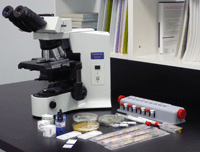We perform mold inspection in buildings and also on imported and local products.
Why is Mold Inspection and Testing Important?
Harmful molds can contaminate home and work environments, production facilities, raw materials, and branded products. Accurate identification of environmental isolates is important to support active environmental monitoring programs within home, work and manufacturing environments and to implement accurate Corrective and Preventive Actions (CAPAs) for products and processes to reduce the risk of contamination. Identification of fungi at the species level is recommended in high risk environments such as hospitals.
Mold Inspection on Imported Products
Importers sometimes receive products which exhibit discoloration or other surface imperfections, or they may have a musty, earthy smell. These are signs of microbial growth. Mold growth poses a serious problem for many vendors and retailers since such products cannot be sold. MBS can perform mold inspection on products and help you answer the following questions:
• Is it mold growth?
• Do you have to dispose of the entire shipment?
• Can the products be cleaned without causing aesthetic and/or physical damage?
• What is the likely cause of microbial growth and is there anything that could have been done to prevent this?
Mold inspection and testing provides confirmation that surface imperfections, discolorations, or odours are actually caused by mold, and if mold is present, identifies the genus and species. Once there is a positive indication of mold, a plan of corrective action can be explored that includes product cleaning and, more importantly, prevention of future occurrences.
MBS has performed mold inspection, testing and identification for a wide variety of consumer products, such as:
- Garments/clothing
- Textiles/fabric
- Footwear
- Upholstered furniture
- Wooden furniture
- Paper goods/stickers
- Decorative household items
Mold Inspection in Buildings
MBS performs mold inspection in buildings in accordance to the ASTM standard: “Standard Guide for Assessment Of Fungal Growth in Buildings (D7338 – 10)”. The standard is applicable to buildings including residential (for example, single or multi-family), institutional (for example, schools, hospitals), government, public assembly, commercial (for example, office, retail), and industrial facilities.
- Mold inspection may be useful wherever fungal growth is suspected, excess moisture has been present or when there are concerns regarding potential fungal growth.
- Periodic mold inspection in buildings may be a component of preventative maintenance programs.
Levels of mold testing and identification service
We offer three levels of service for nonculturable samples, normal, priority, and top priority.
- Normal service: From receipt of a sample, expected turnaround times are up to 3 business days for molds.
- Priority service: The expected turnaround times from receipt of a sample are 24 hours for molds
- Top priority service: Processing of your sample will be fast-tracked. Expected turnaround times are 12 hours depending on the number of samples.

Laboratory Services
Samples collected during mold inspection are tested at Mold & Bacteria Consulting Laboratories(MBL). MBL has a full service microbiology laboratory with highly qualified analysts. Apart from mold testing, MBL analyzes wastewater and sewage for Total and Fecal Coliform, E. coli, Fecal Streptococcus, and Enterococcus. MBL can also analyze surface samples, tape slides, Air-O-Cell cassettes, Anderson Impacters, and swab samples for an extensive list of molds, pollens, and air particulates. MBL serves industrial hygienists, mold abatement companies, government agencies, insurance companies, and environmental consultants. Our mold and bacteria testing lab is dedicated to superior customer service and maintaining high standards for mold sampling results and laboratory analysis. Our laboratory is accredited by the Canadian Association for Laboratory Accreditation (CALA) and is also rated proficient by the AIHA EMPAT program. MBL can help develop and ultimately provide custom sampling protocols based on specific client needs, for either individual or any combination of microbiological constituents. The identification service is performed on a confidential basis.